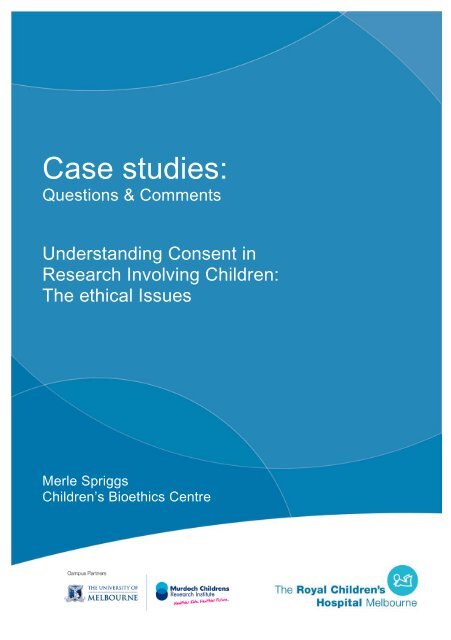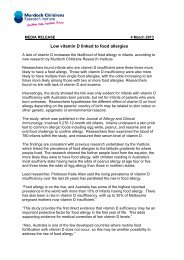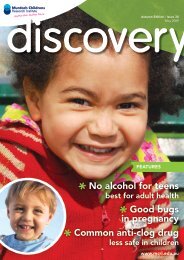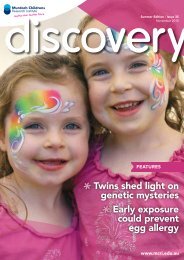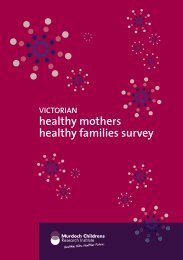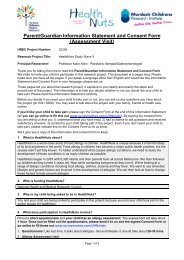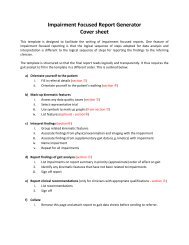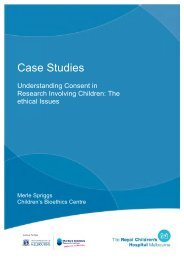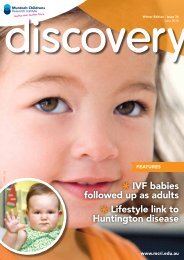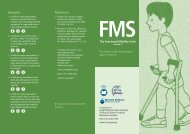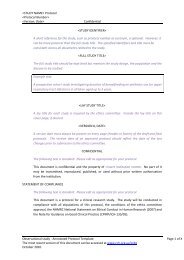Case studies: - Murdoch Childrens Research Institute
Case studies: - Murdoch Childrens Research Institute
Case studies: - Murdoch Childrens Research Institute
Create successful ePaper yourself
Turn your PDF publications into a flip-book with our unique Google optimized e-Paper software.
<strong>Case</strong> <strong>studies</strong>:<br />
Questions & Comments<br />
Understanding Consent in<br />
<strong>Research</strong> Involving Children:<br />
The ethical Issues<br />
Merle Spriggs<br />
Children’s Bioethics Centre
<strong>Research</strong> Team<br />
Lead Investigator: Dr Merle Spriggs<br />
Children's Bioethics Centre<br />
<strong>Murdoch</strong> <strong>Childrens</strong> <strong>Research</strong> <strong>Institute</strong><br />
PO BOX 911<br />
Parkville, Vic. 3052, Australia.<br />
Phone: +61 3 9090 5237<br />
Email: merle.spriggs@mcri.edu.au<br />
Website: http://www.mcri.edu.au/projects/ConsentIn<strong>Research</strong>/<br />
Co-investigators: Associate Professor Lynn Gillam; Professor Colin Thomson;<br />
Associate Professor Justin Oakley<br />
Steering Committee: Dr Helen Liley; Professor Wendy Rogers; Assoc. Prof. Jane<br />
Halliday; Assoc. Prof. Sylvia Metcalfe; Dr Craig Olsson; Dr Catherine Lees; Dr<br />
Arnold Smith; Dr Lyndal Bond; Ms Malar Thiagarajan.<br />
Acknowledgments<br />
Thanks for the valuable input from:<br />
• Associate Professor Lynn Gillam<br />
• Professor Colin Thomson<br />
• Professor Wendy Rogers<br />
• Dr Judith Munro<br />
• Ms Alexandra Robertson<br />
• Dr Catherine Lees<br />
• Ms Georgina Hall<br />
This project is funded by a grant from the Alfred Felton Bequest which is managed by<br />
the ANZ Trustees<br />
Version 2 © Merle Spriggs 2009<br />
<strong>Case</strong> Studies<br />
i
Table of Contents<br />
<strong>Research</strong> Team<br />
Acknowledgments<br />
i<br />
i<br />
Purpose of this Resource 2<br />
CASE 1 3<br />
Adolescent invited to take part in research without parental consent: Consent to<br />
research versus consent for other activities.<br />
CASE 2 5<br />
Consent issues in research involving MySpace<br />
CASE 3 10<br />
Unobtrusive observation: <strong>Research</strong> involving an on-line support group<br />
CASE 4 13<br />
Opt-out consent and the role of parental consent in a study in a child care centre.<br />
CASE 5 16<br />
<strong>Research</strong> involving infants: Risky research and the framing of risk.<br />
<strong>Case</strong> Studies 1
Purpose of this Resource<br />
This resource provides guidance on thinking through ethical issues in research<br />
involving children and young people and presents some models for best practice.<br />
Some cases will be easy and some will be hard. It is intended that there will be some<br />
contrasts.<br />
The cases could be used for training Human <strong>Research</strong> Ethics Committees (HRECs)<br />
and in research ethics education for researchers who are going to conduct research<br />
with children.<br />
Some cases are real, some are based on real life cases and some are fictitious.<br />
They are labelled accordingly.<br />
<strong>Case</strong>s are designed to raise issues for deliberation by Human <strong>Research</strong> Ethics<br />
Committees and researchers in situations in which they have not found sufficiently<br />
clear guidance in the National Statement. Any guidance provided in this resource is<br />
meant to build on the National Statement.<br />
We welcome new case <strong>studies</strong> to add to this resource. To add a case, email<br />
merle.spriggs@mcri.edu.au<br />
Note –The term “assent” is not used in the National Statement, but it is widely<br />
referred to in the research community and it is established in the literature. We use<br />
the term here to signify the role for children that lies between no involvement in<br />
discussions and full decisional authority. 1<br />
1 M. Spriggs & L. Gillam. (2008). Consent in paediatric research: An evaluation of the guidance provided in the<br />
2007 NHMRC National Statement on Ethical Conduct in Human <strong>Research</strong>. Medical Journal of Australia.<br />
188(6): 360-362.<br />
<strong>Case</strong> Studies 2
CASE 1<br />
[Fictitious case]<br />
Adolescent invited to take part in research without<br />
parental consent: Consent to research versus consent<br />
for other activities.<br />
A 14-year-old youth suffering depression does not want to discuss his problems with<br />
his parents. He seeks help from a community health centre. On his first visit he is<br />
provided with counselling and asked to return for a second visit where the possibility<br />
of medication will be discussed. He is reassured that his parents do not have to be<br />
involved if he does not want them to be. <strong>Research</strong>ers from the centre are looking for<br />
people to take part in a study that will find out if a new investigational drug can help<br />
in the treatment of depression. They invite the fourteen year old to participate in the<br />
randomised controlled trial. The researchers say that parental consent is not needed<br />
for the 14-year-old to access treatment so they do not need to obtain parental<br />
consent for him to participate in the research.<br />
Questions:<br />
1. Is the researchers’ view correct?<br />
Comments:<br />
The researchers view is not correct here. Allowing independent access to treatment<br />
by the 14-year-old is not in itself an indication of his competence. It does not mean<br />
that his consent is sufficient to authorise participation in a randomised controlled<br />
trial of an experimental drug. There are three reasons why the researchers’<br />
reasoning is not right:<br />
i. <strong>Research</strong> and treatment are ethically different. They have different<br />
objectives, procedures and justifications. The goal of treatment is always the<br />
benefit of the patient. Any risks involved in treatment can be expected to be<br />
monitored carefully and individually and there will be no ethical interest that will<br />
compete with changing treatment whenever that is seen to be for the patient’s<br />
best interests. The goal of research is the discovery of knowledge. Although<br />
researchers do have ethical responsibilities for the welfare of participants, that<br />
welfare is not the researcher’s primary responsibility. There will always be a<br />
competing ethical interest (namely the completion of the research) that can<br />
compete with the care of participants. Therefore, it cannot be assumed that<br />
consent in the research setting is ethically equivalent to consent in the clinical<br />
setting.<br />
ii. A decision to participate in research can be more complex and require a<br />
greater level of competence and understanding. Risks can be greater in<br />
research or more uncertain because of the experimental context. The fact that<br />
the effectiveness and safety of the drug is not known, means that the risks are,<br />
<strong>Case</strong> Studies 3
to an important extent, unknown and so may be greater than in treatment with<br />
an established drug.<br />
iii. Giving young people independent access to treatment does not in itself<br />
indicate a particular level of competence. It is often assumed that<br />
independent access necessarily means that the young person is competent.<br />
This might be the reason for giving access, but it could also be to protect from<br />
harm. Independent access could be a public health response “designed to<br />
encourage adolescents to seek health care for problems which they might deny,<br />
ignore, or delay if they had to inform their parents and/or get parental<br />
permission”. 2<br />
It is a common mistake to assume that parental consent is not needed because<br />
young people can consent to other activities. For instance, Kelly and Halford<br />
(2007) argue that 16-year-olds in Australia have the “maturity and capacity” to<br />
make an “informed decision” because they can legally consent to sexual<br />
intercourse (and deal with risks such as unwanted pregnancy and/or sexually<br />
transmitted disease). Based on this, they conclude that the same 16-year-old’s<br />
consent should be adequate “to fill in a form reporting anonymously on their<br />
sexual behavior.” 3 Their view that parental consent is not needed is<br />
appropriate but the reasons are wrong. Consenting to sexual intercourse is<br />
not the same as consenting to involvement in research. Reasons matter.<br />
Mistaken reasons can lead to an ethically inappropriate conclusion.<br />
2. Does it depend on the nature of the research?<br />
Comments:<br />
Yes, it depends on the nature and complexity of the research [4.2 Intro]<br />
The 14-year-old’s consent alone may be adequate to allow participation in a<br />
different study in which the decision to take part requires understanding of less<br />
complex information, and/or consideration of less significant consequences – for<br />
example, an anonymous questionnaire about the user friendliness of the clinic<br />
where there is no medical or privacy risk.<br />
2 Friedman Ross, Lanie. (2006). Children in medical research. , Oxford: Clarendon Press. Pp.92-3<br />
3 Kelly A. B. and Halford W. K. (2007). Responses to ethical challenges in conducting research with Australian<br />
adolescents. Australian Journal of Psychology. 59(1):24-33. p. 26<br />
<strong>Case</strong> Studies 4
CASE 2<br />
[Fictitious case]<br />
Consent issues in research involving MySpace<br />
Sixteen-year-old Sophie has chosen the option to set her MySpace profile to public<br />
viewing. She has filled in the ‘about me’, and ‘I’d like to meet’ areas of her profile<br />
and has included requests to ‘E-mail me’. Her profile is intentionally constructed in<br />
the hope of receiving feedback from those who view it.<br />
A researcher is conducting a study on bullying at school and young people’s<br />
experience of it. He is recruiting and collecting data via the internet from children<br />
and young people aged 12 to 16. In the first stage of the study he proposes to<br />
collect data from what is posted on Sophie’s MySpace site without Sophie’s consent<br />
and without parental consent. In the second stage of the study, the researcher plans<br />
to post/email questions for Sophie to answer i.e. to generate new data. The<br />
researcher will sign up as Sophie’s friend and then, if accepted, will post questions<br />
for her to answer, without making clear that this is research.<br />
Questions:<br />
First stage of project:<br />
1. Is Human <strong>Research</strong> Ethics Committee (HREC) approval needed?<br />
Comments:<br />
*This is a new research area. There are no detailed or universally accepted ethics<br />
guidelines.<br />
In the National Statement, internet-based research fits the description of<br />
human research. <strong>Research</strong> is an “investigation undertaken to gain<br />
knowledge and understanding” and human research is “research conducted<br />
with or about people, or their data.” 4 Institutions are required to see that any<br />
human research they conduct or for which they are responsible is “ethically<br />
reviewed and monitored in accordance with the National Statement”<br />
[5.1.1.(b)]. However, research that “is negligible risk research” and “involves<br />
the use of existing collections of data or records that contain only nonidentifiable<br />
data about human beings” can be exempted from review<br />
[5.1.22]. According to the National Statement, in deciding to exempt<br />
research from ethical review, institutions “must recognise” that they are<br />
“determining that the research meets the requirements of the National<br />
Statement and is ethically acceptable [5.1.23]. <strong>Research</strong>ers are required to<br />
4 National Health and Medical <strong>Research</strong> Council, Australian <strong>Research</strong> Council, Australian Vice-Chancellors’<br />
Committee [Internet]. National Statement on Ethical conduct in Human <strong>Research</strong>. Canberra: Australian Government;<br />
2007. Available from http://www.nhmrc.gov.au/publications/synopses/_files/e72.pdf p.101 and p.3.<br />
<strong>Case</strong> Studies 5
“keep an auditable record of any research” they are “undertaking that is<br />
exempted from ethical review in accordance with paragraphs 5.1.22 and<br />
5.1.23” [5.1.8]. And, institutions are to “make publicly accessible summary<br />
descriptions of all research projects for which consent was waived e.g. in its<br />
annual report” [2.3.8] While not conclusive, this implies a need for HREC<br />
review.<br />
The definition of what constitutes human subject research may be different<br />
in other countries e.g. Canadian regulations 5 and U.S. regulations. 6 Some<br />
have argued that under U.S. and Canadian regulations, internet-based<br />
research is exempt from Institutional Review Board (IRB) or ethics<br />
committee review. For example, under Canadian regulations, research<br />
“based exclusively on publicly available information, documents, records,<br />
works, performances, archival materials or third-party interviews, is not<br />
required to undergo ethics review.” 7 Another view is that internet-based<br />
research moves into a human subject paradigm “when engaging active<br />
analyses, where researchers participate in communications; or when<br />
researchers identify themselves and gather information through online<br />
communications.” 8<br />
A lack of applicability and clarity in the various guidelines suggests a need to<br />
update the various guidelines or develop universal guidelines for internetbased<br />
research, especially the combination of internet-based research and<br />
young people.<br />
2. Can the researcher use content from Sophie’s MySpace profile without<br />
Sophie’s consent?<br />
Comments:<br />
This is contentious. There are different views:<br />
• Consent is needed<br />
• Consent is not needed<br />
<strong>Research</strong>ers generally do not need consent to use information that is in the public<br />
domain - but what is public and what is private on the internet is not so clear and the<br />
immature judgment of some young people may mean that a distinction between<br />
public and private is not meaningful. Some young people may not seem to be<br />
concerned about their privacy but this may be due to a lack of maturity,<br />
understanding and imagination. Recent research findings show that young people<br />
5 Canadian <strong>Institute</strong>s of Health <strong>Research</strong>, Natural Sciences and Engineering <strong>Research</strong> Council of Canada, Social<br />
Sciences and Humanities <strong>Research</strong> Council of Canada, Tri-Council Policy Statement: Ethical Conduct for <strong>Research</strong><br />
Involving Humans. 1998 (with 2000, 2002 and 2005 amendments). <strong>Research</strong> requiring ethics review<br />
http://www.pre.ethics.gc.ca/english/policystatement/section1.cfm#1A Article 1.1.c (Accessed 23 April 2009)<br />
6 Code of Federal Regulations. TITLE 45 — PUBLIC WELFARE. Department of Health and Human Services<br />
PART 46. PROTECTION OF HUMAN SUBJECTS, Revised June 23, 2005. Effective June 23, 2005 Available at<br />
http://www.hhs.gov/ohrp/documents/OHRPRegulations.pdf (Accessed 23 April 2009)<br />
7 Tri-Council Policy Statement Article 1.1.c<br />
8 Kitchin Heather A. (2003). The Tri-Council policy statement and research in cyberspace: <strong>Research</strong> ethics, the<br />
internet, and revising a 'living document', Journal of Academic Ethics. 1:397-418<br />
<strong>Case</strong> Studies 6
can be “somewhat naive” about the appropriateness and the “potential negative<br />
consequences” of information they post on social networking sites. 9 Added to this<br />
are the difficult issues around consent in research involving children and young<br />
people.<br />
If information is potentially identifiable, consent is probably needed. If there is no<br />
identifiable information, consent may not be needed. But, arguably, it is better to err<br />
on the side of safety and obtain consent.<br />
If the researcher does not want to get consent, he or she could make a case<br />
according to the National Statement criteria for waiver of consent [see sections<br />
2.3.5 to 2.3.8] The main criteria relevant in this case are as follows:<br />
• A waiver of consent must be granted by an HREC (for using personal<br />
information in medical research) or other review body (other research) [2.3.5].<br />
• Before waiving the requirement for consent, an HREC or review body must be<br />
satisfied that:<br />
- the research is “no more than low risk” [2.3.6 (a)] i.e. “the only<br />
foreseeable risk is one of discomfort” [2.1.6].<br />
- “the benefits from the research justify any risks of harm associated with<br />
not seeking consent” [2.3.6. (b)]<br />
- “it is impracticable to obtain consent … [2.3.6 (c)]<br />
- “There is no known or likely reason for thinking that participants would<br />
not have consented if they had been asked” [2.3.6 (d)]<br />
- “There is an adequate plan to protect the confidentiality of data” [2.3.6<br />
(f)]<br />
• “Given the importance of maintaining public confidence in the research process”<br />
institutions are to make publicly accessible summary descriptions of all research<br />
projects for which consent was waived e.g. in its annual report [2.3.8]<br />
3. Can the researcher use the potentially identifiable content on the basis of<br />
Sophie’s consent alone without parental consent?<br />
Comments:<br />
Parental consent is not needed if the research does not involve the collection of<br />
identifiable information e.g. content analysis – simply counting instances of<br />
something.<br />
Parental consent might be needed when information is potentially identifiable.<br />
Identifiable information makes risks to individuals higher.<br />
If risk involves more than discomfort, a decision to forgo parental consent should<br />
be clearly articulated and justified in terms of the nature of the study which includes<br />
level of risk etc. or in terms of other additional protections such as procedures set<br />
up to obtain and validate young people’s informed and voluntary agreement to<br />
participate. It may be possible to establish young people’s competence to consent<br />
9 J. Peluchette & K. Karl. Social networking profiles: An examination of student attitudes regarding use and<br />
appropriateness of content. CyberPsychology & Behavior 2008; 11(1):95-97: 96<br />
<strong>Case</strong> Studies 7
via the internet e.g. with mandatory questions which show that the young person<br />
does or does not understand what participation entails. There is also a need to<br />
consider whether seeking parental consent would make things worse e.g. (i) by<br />
putting a young person from a dysfunctional home at risk; (ii) result in disclosure to<br />
the researcher of additional identifying information about the identity and location of<br />
the young person. Parental consent may be “impracticable” for reasons other than<br />
that suggested in the National Statement. It can be “impracticable” when it offers<br />
no protection or makes matters worse.<br />
<strong>Research</strong>ers need a clear plan and HRECs have to be satisfied that the<br />
procedures set up to obtain and validate young people’s informed and voluntary<br />
agreement to participate are sufficient and appropriate in the circumstances.<br />
4. If parental consent is deemed necessary but logistically difficult to obtain,<br />
can the researcher wait for 15 months until Sophie turns 18 and then use<br />
the data without parental consent but with Sophie’s consent?<br />
Comments:<br />
Yes. But as a researcher you have to make clear to Sophie that it is old content<br />
(data from the 1 st stage) that you want to use. It may actually be good practice to<br />
wait until Sophie turns 18 because she is then better able to make an informed<br />
choice.<br />
Second stage of project:<br />
5. For the second stage of the study, is Sophie’s electronic acceptance of the<br />
researcher as a ‘friend’ equivalent to consent? Is it enough consent? What<br />
should the researcher disclose?<br />
Comments:<br />
Acceptance as a “friend” is not equivalent to consent if the researcher/friend has<br />
not disclosed that they are conducting research. Sophie needs to know further<br />
details such as what the research is about, the data collection methods and how<br />
and where the research will be reported and she needs to know that involvement<br />
is voluntary, that she does not have to be involved.<br />
Normally, a researcher [who is not a cyber researcher] could not use the<br />
justification that he or she is a friend to collect and use personal communications<br />
without the consent of the friend - but again depending on the nature of the<br />
research, the information and how it is reported etc.<br />
The issue is about appropriate conduct for researchers on MySpace, not<br />
ordinary users who are not conducting research.<br />
The use of information from social network sites and acceptance of a researcher<br />
as a “friend” were recent topics of discussion on an online discussion forum for<br />
<strong>Case</strong> Studies 8
individuals concerned about and involved in human subject’s protection. See<br />
http://www.irbforum.org/ to join IRB Forum and access discussion threads.<br />
6. Is parental consent needed for the second stage of the study?<br />
Comments:<br />
While parental consent might not be needed in the first stage of the project (see<br />
question 3), that does not mean that it is not needed in the second stage. The<br />
question of consent in stage 2 is independent from stage 1. In stage 2 different<br />
data is collected via a different method. The researcher interacts with participants<br />
e.g. he causes Sophie to say things she otherwise would not have said. The need<br />
for parental consent will depend on the questions asked, the likelihood of harm<br />
through identification and whether the HREC is satisfied that the young person<br />
understands relevant information. At 16, parental consent is probably not needed<br />
for Sophie but researchers should clearly set out the procedures they will use to<br />
secure and validate Sophie’s informed and voluntary agreement to participate in the<br />
research. (Parental consent may be required for younger children involved in this<br />
study. As in question 3, a decision to forgo parental consent should be clearly<br />
articulated).<br />
Note: Before planning a project using a social networking site such as MySpace,<br />
researchers might want to consider the site’s terms and conditions which in the<br />
case of MySpace, apply to Members and to Visitors (who simply browse the<br />
MySpace website). 10<br />
MySpace can reject, refuse to post or remove postings, suspend or terminate<br />
access to MySpace Services if the agreement is violated or if a User is perceived<br />
as a threat to MySpace or its Users. The following terms and conditions may have<br />
relevance to researchers:<br />
- If you recruit by having your own MySpace profile and MySpace believes that<br />
you are incorrectly representing yourself as being under 18, MySpace can<br />
delete your profile and terminate your membership without warning.<br />
- MySpace may investigate, terminate membership and take legal action against<br />
anyone who: “solicits personal information from anyone under 18”; posts<br />
content that “contains restricted or password only access pages”<br />
10<br />
MySpace Terms & Conditions. February 28 th , 2008. Available at:<br />
http://www.myspace.com/index.cfm?fuseaction=misc.terms (Accessed 7 th May 2009)<br />
<strong>Case</strong> Studies 9
CASE 3<br />
[Based on real life case]<br />
Unobtrusive observation: <strong>Research</strong> involving an online<br />
support group<br />
A psychologist researching young people who engage in self-harming behaviours<br />
has chosen an online support group to obtain data. He has chosen a ‘pro-anorexia’<br />
online support group. Members of the group advise on how to become and remain<br />
anorexic. An important feature of the group is that it allows unguarded self-disclosure<br />
while offering anonymous support and acceptance amongst its members. The<br />
proposed study will provide health professionals with an ‘insight that may otherwise<br />
be unattainable’ and this insight ‘can contribute to the development of effective<br />
therapies and treatments’ for anorexia. 11 Unobtrusive, passive observation is the<br />
method chosen by the researcher in order to protect the group from disruption and to<br />
avoid interviewer bias. This method can be likened to eavesdropping on the on-line<br />
exchanges and the members of the group do not know that they are being observed<br />
and researched.<br />
Questions:<br />
1. When is unobtrusive observation on the internet without consent<br />
acceptable?<br />
Comments:<br />
In public places unobtrusive observation without consent is generally regarded as<br />
ethically acceptable, at least in some circumstances. So, it may be acceptable online<br />
e.g. where there is no expectation of privacy and no threat of harm to<br />
individuals through identification and participants are not part of a group that is<br />
vulnerable or susceptible to forms of harm which the research may exacerbate.<br />
However, observational research on the internet can involve risk where off-line<br />
observational research may not e.g. search engines such as Google can link<br />
quotes from public on-line sites to individuals. This could compromise confidentiality<br />
and could harm individuals if the communication is of a sensitive nature. This<br />
should be taken into account. If researchers want to do this they must make a case<br />
to the HREC as to why they are justified in conducting the research without consent<br />
– see National Statement chapter 2.3.<br />
11 Gavin, Rodham and Poyer, “The presentation of ‘Pro-Anorexia’ in online group interactions” 326. This case is<br />
based on a study about issues of identity in ‘pro-anorexia’ online group interactions.<br />
<strong>Case</strong> Studies 10
2. Does it depend on what sort of group it is?<br />
Comments:<br />
The acceptability of unobtrusive observation, the need for HREC review and<br />
consent can depend on what sort of group it is and the vulnerability of the members<br />
in the group. Members of a pro-anorexia group could be considered a vulnerable<br />
group because of their psychiatric status e.g. care should be taken to determine<br />
whether participant’s mental illness “increases their susceptibility to some forms of<br />
discomfort or distress” [NS 4.5.2].<br />
The nature of some groups is such that even unobtrusive observation can end up<br />
with researchers unintentionally destroying the thing they are researching e.g.<br />
internet communities such as support groups in which members do not expect to be<br />
observed by outsiders:<br />
When I joined this, I thought it would be a support group, not a fishbowl for a<br />
bunch of guinea pigs. I certainly don’t feel at this point that it is a safe<br />
environment, as a support group is supposed to be, and I will not open myself up<br />
to be dissected by students or scientists. 12<br />
3. If the researcher changes pseudonyms and paraphrases quotes, is this<br />
sufficient to avoid identification of individuals?<br />
Comments:<br />
It may not be if the group is from a relatively small population and easily recognised<br />
because they are a minority group e.g. a pro-anorexia site. Search engines such as<br />
Google add to the possibility of identification of individuals even if pseudonyms are<br />
used.<br />
Further questions:<br />
4. If a researcher felt that the identity of individuals in a ‘pro-anorexia’ website<br />
support group need not be protected given that they promote harm to self<br />
and others, would this be relevant?<br />
Comments:<br />
On the face of it there may seem to be no justification for protecting the identity of<br />
individuals who promote harm to self and others but it should be remembered that<br />
12 Eysenbach Gunther, Till James E. (2001). Ethical issues in qualitative research on internet communities, BMJ.<br />
323: 1103-1105. P.1104<br />
<strong>Case</strong> Studies 11
adolescents with anorexia are a vulnerable group with a mental illness. In any<br />
case, the research context is not the appropriate forum in which to expose or “out”<br />
people. Confidentiality should be protected for all participants.<br />
5. If the researcher felt that the members would be better served if the group<br />
was disrupted, is this relevant to the ethics of the research?<br />
Comments:<br />
No. If there is a need to disrupt the group it should be done in a more sensitive<br />
way, without causing additional harm, and it should be done in another context<br />
entirely such as public health.<br />
This situation could be compared to research about illegal activities. It is generally<br />
accepted that it is not ethically appropriate for researchers to attempt to stop illegal<br />
behaviour or expose criminals in the process of research. These activities are to<br />
be left to appropriate authorities such as the police.<br />
<strong>Case</strong> Studies 12
CASE 4<br />
[Real life case]<br />
Opt-out consent and the role of parental consent in a<br />
study in a child care centre.<br />
An experiment designed to study the spread of germs in a U.S. child care centre was<br />
closed down after a parent complained that the experiment was done without<br />
consent. <strong>Research</strong>ers sprayed a solution containing DNA fragments of a plant virus<br />
on toys, doorknobs and other surfaces in a number of day-care centres to track the<br />
spread of germs. The purpose was to find more effective ways of controlling germs in<br />
a child-care setting. No health risk to the children was anticipated.<br />
The DNA-based “marker” solution was placed in one toddler classroom in each of 14<br />
day-care centres. “There were 249 children, 1 to 2 years old, in those classrooms.<br />
Hundreds more children were present in other areas of the day-care centres and<br />
potentially were exposed to the marker as it was spread.”<br />
A letter outlining the study was left with each child’s belongings but written consent<br />
was not sought until after the children had been exposed to the solution.<br />
<strong>Research</strong>ers then approached parents asking for permission to swab the children’s<br />
hands to see if the solution was present. According to one proponent of the study:<br />
“parents were given the opportunity to opt out of the experiment, but none did”. 13<br />
Questions:<br />
1. Is leaving a letter with the children’s belongings a good enough way of<br />
contacting parents?<br />
Comments<br />
No. Unless parents receive the letter, “opt-out consent” amounts to no consent.<br />
Information could be mailed out but that can be unreliable also. Personally<br />
handing the information to parents would ensure that they receive it and that they<br />
do have the opportunity to “opt-out”.<br />
13 Bill Sizemore. A study in ethics: A parent’s complaint shut down a germ-tracking medical experiment in local daycare<br />
centres and raised questions about researchers’ responsibility to get informed consent. The Virginian-Pilot, 3<br />
August, 2003.<br />
<strong>Case</strong> Studies 13
2. Is opt-out consent from the first phase of the study ethically acceptable, or<br />
should it be opt-in?<br />
Comments<br />
First of all, it is important to be clear about what is meant by “opt-out” consent.<br />
To implement “opt-out” consent, means that a person will be included by default<br />
unless they choose to “opt-out.”<br />
Seeking opt-out consent is different to not seeking consent – it changes the<br />
process by which people indicate that they have given consent. Usually, people<br />
have to take action to give consent; in opt-out consent, taking no action is the<br />
way to indicate consent.<br />
In general, opt-out consent is regarded as rather problematic but possibly<br />
justified in some circumstances. Because of the age of the children and the<br />
child-care setting, there are good reasons for consent to be opt-in [see<br />
comments on question 4].<br />
The term “opt-out” consent is not used in the National Statement. Nevertheless,<br />
it is a term that is in current use and one that came up in a number of the key<br />
informant interviews with researchers and with HREC members.<br />
3. Is the first phase of the study really ethically different from the second<br />
phase?<br />
Comments<br />
The key question is whether the differences make an ethical difference – although<br />
this does not settle the question of whether opt-in or opt-out consent is needed.<br />
The main difference is interaction between the researcher and some children<br />
(hand swabbing) in the second phase of the study. It is not physically more risky,<br />
but it is noticeable to the child, it maybe upsetting etc.<br />
One way of trying to think through the issues is to imagine yourself as a parent<br />
whose child is involved in the study.<br />
<strong>Case</strong> Studies 14
4. Was parental consent needed at all?<br />
Comments<br />
Ethical issues include: potential for harm; respect for parents; and public trust.<br />
The main justification for thinking that parental consent is not needed:<br />
- There was no risk to the children and the research was potentially beneficial<br />
plus, it is hard to see why parents would object<br />
Justification for thinking that parental consent is needed:<br />
- Parents should be informed when something is done to their child that is not<br />
part of the regular day-care routine even if no harm is anticipated. Parents<br />
might not know about all activities that their children are involved in during the<br />
day but there is an expectation that activities are part of an established child<br />
care program rather than being determined by goals of a research project.<br />
- There is some value in getting parental consent other than the protection it<br />
confers before including infants in research. Parent’s interest in making<br />
decisions concerning their children is the basis of that value. 14<br />
- The support of the public is needed for research to proceed and even the<br />
perception of a failure of consent can have an adverse effect on public trust in<br />
research. It is recognised that scandals such as the retention of children’s<br />
organs by hospitals in the UK have adversely affected the donation of tissue<br />
for legitimate research - even research that is not directly linked to the<br />
scandal. 15 There is evidence that in Australia, unauthorised retention of<br />
children’s organs led to reduced trust in health professionals. 16<br />
14 Buchanan A.E. and Brock D. W. (1990) Deciding for others: The ethics of surrogate decision making. Cambridge:<br />
Cambridge University Press. Chapter 5.<br />
15 Seale, C, Kirk D, Tobin M, et al. Effect of media portrayals of removal of children’s tissue on UK tumor bank. BMJ<br />
15 August 2005; 331:401-403<br />
16 Monagle P., Rob B., Driscoll S. and Bowes G. 2002. Organ retention following paediatric and perinatal autopsy:<br />
Where to from here? Journal of Paediatric Child Health 38: 405-408<br />
<strong>Case</strong> Studies 15
CASE 5<br />
[Real life case]<br />
<strong>Research</strong> involving infants: Risky research and the<br />
framing of risk.<br />
Effect of exposure to 15% oxygen on breathing patterns and<br />
oxygen saturation in infants: interventional study.<br />
<strong>Research</strong>ers carried out a study investigating the response of healthy infants to<br />
airway hypoxia (low oxygen) after reports that two infants had died from sudden<br />
infant death syndrome (SIDS) after intercontinental flights. The study involved 34<br />
healthy infants. Most were recruited from an obstetric unit while 13 were recruited<br />
from families receiving support in caring for an infant after a previous infant had died<br />
from SIDS. During the course of the study four infants had severe falls in oxygen<br />
saturation. A finding from the study was that ‘exposure to airway hypoxia similar to<br />
that experienced during air travel or on holiday at high altitude may be harmful to<br />
some infants’.<br />
In response to the question of whether it was ethically justified to expose healthy<br />
infants to 15% oxygen, the researchers claim that “Many infants travelling on<br />
aeroplanes or to holidays at high altitude are exposed to similar or even more<br />
markedly reduced partial pressures of inspired oxygen. Yet this exposure is<br />
considered safe”.<br />
See the study and commentaries by an ethicist and the chair of the ethics<br />
committee that approved the research in BMJ 1998 vol. 316: 887-894 [link to free<br />
access article - http://www.bmj.com/cgi/content/full/316/7135/887 ]<br />
Parkins K. J., Poets C. F., O'Brien L. M., Stebbens V. A. and Southall D. P. (1998).<br />
Effect of exposure to 15% oxygen on breathing patterns and oxygen saturation in<br />
infants: interventional study. BMJ 1998; 316: 887-891<br />
Julian Savulescu. (1998). Commentary: Safety of participants in non-therapeutic<br />
research must be ensured. . BMJ 1998; 316: 891-892<br />
Vivian Hughes (1998). Commentary: Ethical approval of study was warranted. BMJ<br />
1998; 316: 892-893<br />
Parkins K. J., Poets C. F., O'Brien L. M., Stebbens V. A. and Southall D. P. (1998).<br />
Authors' reply. BMJ 1998; 316: 893-894<br />
<strong>Case</strong> Studies 16
Questions:<br />
1. Rather than talking about the small risk of sudden death, is it acceptable to<br />
describe the risks of participation as involving no more risk than what<br />
infants are exposed to if they were travelling on an aeroplane or taken on a<br />
holiday to an area of high altitude?<br />
Comments:<br />
Possible justifications for framing risk in terms of aeroplane travel and holidays in<br />
areas of high altitudes are: (a) to save parents from too much worry, and (b) to<br />
frame risk in a way that is easily understood.<br />
(a) is not an acceptable justification. Full disclosure of risks is necessary for parents<br />
to be able to make an informed decision about their child’s participation. In general<br />
(b) is a good thing, but in this case it may mislead in the sense that it may deflect<br />
consideration away from whether the risk is worth taking for this purpose (i.e.<br />
research). As Savulescu argues: “People judge that some risks are worth taking,<br />
but it is up to them to make that evaluation. Though driving a car or flying in an<br />
aeroplane does entail risk, it is wrong to assume that a person would take on this<br />
risk to participate in research.”<br />
One way of trying to think through this is to imagine yourself as a parent invited to<br />
consent for your child to take part in the research. Would you want researchers to<br />
frame risks in a way that does not cause you too much worry or would you rather be<br />
“scrupulously informed” of risks no matter how small?<br />
2. Is the study too risky for children i.e. parents shouldn’t be allowed to even<br />
be asked?<br />
Comments<br />
A study is clearly high risk if it has a high probability of causing severe harm. This<br />
study has as very low probability of causing severe harm (or death), but not zero<br />
probability. This makes its level of risk disputable. There would be two views on<br />
this:<br />
(a) It is too much risk and the project should not be allowed to proceed – parents<br />
should not even be offered the choice;<br />
(b) There is a degree of risk, but it is not excessive. Parents should be given full<br />
explicit information about the risk, and allowed to make their own decision.<br />
Different ethics committees are likely to have different views.<br />
<strong>Case</strong> Studies 17


